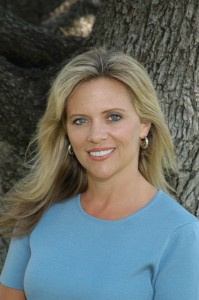Postpartum depression and anxiety are issues that affect many women, and yet our society does not discuss or address these topics nearly enough. That is why we are featuring the expertise of Dr. Kelly Boyd for this week’s Wednesday Wisdom. Dr. Boyd is a licensed psychologist with a private practice in Round Rock, Texas, specializing in reproductive related issues including endometriosis, fertility/assisted reproduction, high-risk pregnancy, pregnancy and postpartum anxiety/depression, NICU issues, medical termination, and perinatal grief and loss. She is on the advisory board of the Pregnancy and Postpartum Health Alliance of Texas, the Association of Reproductive Health Professionals and is an active member of Postpartum Support International.
Dr. Boyd facilitates a free weekly postpartum support group at Any Baby Can, and also does a bi-monthly pregnancy and infant loss group at St. David’s Hospital. She’s the mother of two teens and is very active within the parenting support community. We are so honored to feature her experience and insight on postpartum issues, which impact so many parents, yet are surrounded by much unnecessary stigma, rendering them difficult to openly discuss. And they need to be openly discussed.
BPP: How do you define “Reproductive Psychology”, and what drew you to focusing your practice on these issues?
DKB: Reproductive psychology is defined as the practice of emotional support and counseling given to individuals, families and groups dealing with various types of reproductive issues that don’t go as planned in any part of the reproductive process.
Many people assume the reproductive process will just happen, but often it does not, and we are faced with statements and experiences that can result in feeling “it wasn’t supposed to be like this”. Often these struggles can be traumatic and can affect a person/relationship physically, emotionally, relationally, financially and spiritually. Supportive reproductive counseling can help the person become more aware, gain insight and feel less alone in a process that often feels scary or out of control.
I became interested in reproductive psychology after personally experiencing many of these issues myself. I also began to notice something unique about the assessment and treatment of reproductive related depression, anxiety and grief. While there was tremendous medical care for families, little was being done to emotionally support families through reproductive challenges. So, I became passionate about serving and educating the community and health professionals about the psychology of the reproductive process.
BPP: What are a few major differences between postpartum depression and postpartum anxiety?
DKB: One of my passions is educating about postpartum mood and anxiety disorders. People often only refer to “postpartum depression”, but it’s often not only depressive symptoms. Many women experience both depression and anxiety, and sometimes more of one than the other. Postpartum panic, postpartum OCD and postpartum PTSD also fall under the umbrella of postpartum anxiety disorders. Here are some of the main differences:
Postpartum Depression includes:
- Sadness, irritability, excessive guilt, changes in eating and sleeping, difficulty concentrating, hopelessness, decreased interest in self, baby or things that were once enjoyable.
Postpartum Anxiety includes:
- Excessive worry or fear about the baby, health issues, fear that something terrible may happen, panic attacks, difficulty breathing, fear of losing control. Postpartum OCD (a sub-symptom of anxiety) often includes repetitive, obsessive scary thoughts about harm to the self, baby or family. Postpartum PTSD often happens with a traumatic birth experience and can include many of the above symptoms with the inclusion of nightmares, flashbacks and a re-experiencing of the trauma.
BPP: We imagine that when you meet new clients with postpartum issues, you sometimes wish they’d contacted you sooner. What are some early signs that a woman should reach out for help?
DKB: Often women don’t reach out for help because they are not sure what’s happening, or because of shame and guilt about how they are feeling at a time our society often says is the happiest time in a woman’s life.
Warning signs indicating a need for help:
- Increased isolation and loneliness
- Prior mental health history in self or family that has worsened during pregnancy or postpartum
- Lack of support or relationships with the baby, partners and friends are becoming affected
- Sleep deprivation, hormonal shifts, difficulty with breast feeding may also cause changes in mood that may signal the need for help.
- Fear of losing control and a sense of being overwhelmed by everything
BPP: When you meet a woman struggling with postpartum depression or anxiety, what resources do you try to mobilize for her?
DKB: Individual and couples counseling, postpartum support groups, online support and blogs, increased social support systems, additional support for increasing sleep, nutritional needs, breaks for self care, exercise, massage, acupuncture, meditation/yoga, supplements and/or medication assessment.
BPP: What advice do you have for parenting partners, friends and family members of women struggling with these issues?
- Be supportive and listen to her fears, feelings and concerns. Validate that most of this is a time limited hormonal and life style adjustment that will improve.
- Remind them that they are not alone. This is not forever and not a reflection of the type of parent they are. It is time limited, and with help, increased support and awareness about postpartum issues, they will get well.
- Educate everyone about what postpartum IS, and what it is NOT. There are many myths. Get the facts. Great resources for families are Postpartum Support International and Postpartum Progress.
- Hire and/or give additional help with household chores, night time baby wakings, sleep and self care time.
BPP: Why do you think postpartum issues are so difficult for women to talk about?
DKB: Because of the shame and stigma of maternal emotions being anything other than joyous. There are so many motherhood myths and pressures on new parents, and often we are taught to not talk about difficult or painful emotions regarding our children or adjustment to our new role. Many women also fear that they will be judged as not being a “good mom” if they express how they truly feel at times. Additionally, many express a fear of being viewed as weak or a failure if they don’t get it “just right”. Lastly, our media has mainly profiled extreme cases of postpartum psychosis, and many women fear they will become like that, or associated with the idea that they may harm themselves or their children if they talk about postpartum issues. This is simply not true. Postpartum psychosis is rare. Postpartum anxiety and depression are very common, treatable and are nothing to be ashamed about.
BPP: What would you say to a woman who feels intense shame about her postpartum issues?
DKB: What’s most important is that women realize this is a treatable, time limited experience. With help, increased education, awareness and support, they will get well. It’s not a reflection of them or their parenting. It’s something we get through and are often better for it after we heal and get the well deserved support.
BPP: What are things expectant parents can do before baby’s arrival to prepare for the possibility of postpartum issues?
DKB: Women and families should consider getting support and educated in their pregnancy. Identify potential risk factors, and develop a postpartum intervention/prevention plan. Assess needs for all family members and get resources lined up before the baby arrives. A good prevention plan, open discussion about feelings, fears, expectations regarding sleep, feedings, household chores and transitions often significantly decreases postpartum distress for everyone.
BPP: If you had to give one sanity-saving tip to new parents, what would it be?
DKB: “Please place your own oxygen mask on, before assisting others.”
Many new parents are forgetting how important it is to care for self because they solely focus on the baby or others, often resulting in depletion and exhaustion. Take time for self, which in turn will be a benefit for everyone!
Thank you, Dr. Boyd, for your insight into these incredibly important issues, that we hope will be talked about more and more openly.
Here’s To More Sanity and Less Shame,
C & K ♥






Leave a Reply